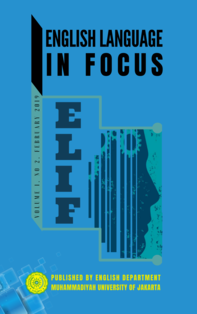The Effect of Using Suggestopedia Among Students’ Speaking Ability
DOI:
https://doi.org/10.24853/elif.1.2.137-144Keywords:
Suggestopedia, students’ speaking abilityAbstract
Speaking is an important skill to communicate in the globalization era. We cannot deny the failure is caused by many problems. The success of the learning is involved in complex things, especially in the lecturer’s ability in learning and teaching. Such as the interesting material, the using of media, the learning approach and strategy, the classroom management, school environment, completely facilitation, and many other aspects. The objective of this research is to find out the effect of using suggestopedia to the students’ speaking ability. The group had taught by using suggestopedia. It had conducted a pre-testing them first, then gave them treatment using suggestopedia and the last conducted a post-test. The instrument was used oral performance test. The criteria of the performance test scoring were a fluency, accuracy, content, and pronunciation. According to the result of statistical calculation, it is obtained the value of (t-observation) is 8,387 and the value of “tc” (t-critical) from the df (31) on degree of significance of 0,05 % is 1.6955. Based on the finding of this study it can be concluded that using suggestopedia method in increasing students’ speaking ability is effective.References
Brown, H. D. (2000). Principles of language Learning and Teaching. New York: Longman.
Jackson, R. L. (2010). Encyclopedia of Identity. Thousand Oaks, CA: SAGE.
Lozanov, G. (2000). Suggestology and Outlines of Suggestopedy. New York: Gordon and Breach.
Nunan, D. (2012). Research Methods in Language Learning. Cambridge: Cambridge University Press.
Nurgiyantoro, B. (2011). Penilaian dalam Pengajaran Bahasa dan Sastra. Yogyakarta: BPFE-Yogyakarta.
Richards, J. C., & Renandya, W. A (Eds.). (2002). Methodology in Language Teaching : an Anthology of Current Practice. Cambridge: Cambridge University Press.
Richards, J. C., & Rodgers, T. S. (2012). Approaches and Methods in Language Teaching. New York: Cambridge University Press.
Downloads
Published
Issue
Section
License
Authors who publish with this journal agree to the following terms:
- Authors retain copyright and grant the journal right of first publication with the work simultaneously licensed under a Creative Commons Attribution License that allows others to share the work with an acknowledgment of the work's authorship and initial publication in this journal.
- Authors can enter into separate, additional contractual arrangements for the non-exclusive distribution of the journal's published version of the work (e.g., post it to an institutional repository or publish it in a book), with an acknowledgment of its initial publication in this journal.
- Authors are permitted and encouraged to post their work online (e.g., in institutional repositories or on their website) before and during the submission process, as it can lead to productive exchanges, as well as earlier and greater citation of published work (See The Effect of Open Access).


